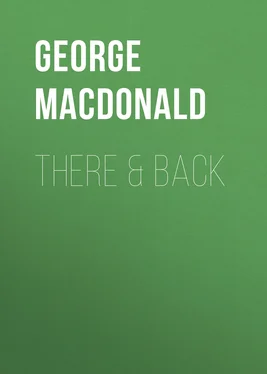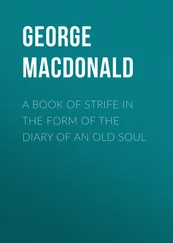George MacDonald - There & Back
Здесь есть возможность читать онлайн «George MacDonald - There & Back» — ознакомительный отрывок электронной книги совершенно бесплатно, а после прочтения отрывка купить полную версию. В некоторых случаях можно слушать аудио, скачать через торрент в формате fb2 и присутствует краткое содержание. Жанр: foreign_prose, foreign_religion, foreign_antique, на английском языке. Описание произведения, (предисловие) а так же отзывы посетителей доступны на портале библиотеки ЛибКат.
- Название:There & Back
- Автор:
- Жанр:
- Год:неизвестен
- ISBN:нет данных
- Рейтинг книги:4 / 5. Голосов: 1
-
Избранное:Добавить в избранное
- Отзывы:
-
Ваша оценка:
- 80
- 1
- 2
- 3
- 4
- 5
There & Back: краткое содержание, описание и аннотация
Предлагаем к чтению аннотацию, описание, краткое содержание или предисловие (зависит от того, что написал сам автор книги «There & Back»). Если вы не нашли необходимую информацию о книге — напишите в комментариях, мы постараемся отыскать её.
There & Back — читать онлайн ознакомительный отрывок
Ниже представлен текст книги, разбитый по страницам. Система сохранения места последней прочитанной страницы, позволяет с удобством читать онлайн бесплатно книгу «There & Back», без необходимости каждый раз заново искать на чём Вы остановились. Поставьте закладку, и сможете в любой момент перейти на страницу, на которой закончили чтение.
Интервал:
Закладка:
John Tuke did right so far as he knew—at least he thought he did—and refused to believe in any kind of God; Jane did right, she thought, as far as she knew—and never imagined God cared about her: let him who has a mind to it, show the value of the difference!
Tuke was a thinking man;—that is, set a going in any direction that interested him, he could take a few steps forward without assistance. But he could start in no direction of himself. At a small club to which he belonged, he had been brought in contact with certain ideas new to him, and finding himself able to grasp them, felt at once as if they must be true. Certain other ideas, new to him, coming self-suggested in their train, he began immediately to imagine himself a thinker, able to generate notions to which the people around him were unequal. He began to grow self-confident, and so to despise. Taking courage then to deny things he had never believed, had only not thought about, and finding he thereby gave offence, he chose to imagine himself a martyr for the truth. He did not see that a denial involving no assertion, cannot witness to any truth; nor did he perceive that denial in his case meant nothing more than non-acceptance of things asserted. Had he put his position logically, it would have been this: I never knew such things; I do not like the notion of them; therefore I deny them: they do not exist. But no man really denies a thing which he knows only by the words that stand for it. When John Tuke denied the God in his notion, he denied only a God that could have no existence.
A man will be judged, however, by his truth toward what he professes to believe; and John was far truer to his perception of the duty of man to man than are ninety-nine out of the hundred of so-called Christians to the things they profess to believe. How many men would be immeasurably better, if they would but truly believe, that is, act upon, the smallest part of what they untruly profess to believe, even if they cast aside all the rest. John cast aside an allegiance to God which had never been more than a mockery, and set about delivering his race from the fear of a person who did not exist. For, true enough, there was no God of the kind John denied; only, what if, in delivering his kind from the tyranny of a false God, he aided in hiding from them the love of a true God—of a God that did and ought to exist? There are other passions besides fear, and precious as fear is hateful. If there be a God and one has never sought him, it will be small consolation to remember that he could not get proof of his existence. Is a child not to seek his father, because he cannot prove he is alive?
The aunt continued to take the boy to church, and expose him, for it was little more she did, to a teaching she could not herself either supply or supplement. It was the business of the church to teach Christianity! her part was to accept it, and bring the child where he also might listen and accept! But what she accepted as Christianity, is another question; and whether the acceptance of anything makes a Christian, is another still.
How much of Christianity a child may or may not learn by going to church, it is impossible to say; but certainly Richard did not learn anything that drew his heart to Jesus of Nazareth, or caught him in any heavenly breeze, or even the smallest of celestial whirlwinds! He learned nothing even that made unwelcome such remarks as his father would now and then let fall concerning the clergy and the way they followed their trade; while the grin, full of conscious superiority, with which he unconsciously accompanied them, found its reflection in the honourable but not yet humble mind, beginning to be aware of its own faculty, and not aware that the religion presented in his aunt’s church, a religion neither honourable nor elevating, was but the dullest travesty of the religion of St. Paul. Richard had, besides, read several books which, had his uncle been careful of the promise he had given his wife, he would have intentionally removed instead of unintentionally leaving about.
In the position Richard had just taken toward his new friends, he was not a little influenced by the desire to show himself untrammelled by prevailing notions, and capable of thinking for himself; but this was far from all that made him speak as he did. Many young fellows are as ready to deny as Richard, but not many feel as strongly that life rests upon what we know, that knowledge must pass into action. The denial of every falsehood under the sun would not generate one throb of life.
Richard told his adoptive parents where he had been, and asked if he might invite his new friends for the next Sunday. They made no objection, and when Arthur and Alice came, received them kindly. Richard took Arthur to the shop, and showed him the job he was engaged upon at the time, lauding his department as affording more satisfaction than mere binding.
“For,” he said, “the thing that is not, may continue not to be; but the thing that is, should be as it was meant to be. Where it is not such, there is an evil that wants remedy. It may be that the sole remedy is binding, but that involves destruction, therefore is a poor thing beside renovation.”
The argument came from a well of human pity in himself, deeper than Richard knew. But both the pity he felt and the truth in what he said came from a source eternal of which he yet knew nothing.
“It would be much easier,” continued Richard, “to make that volume look new, but how much more delightful to send it out with a revived assertion of its ancient self!”
Some natures have a better chance of disclosing the original in them, that they have not been to college, and set to think in other people’s grooves, instead of those grooves that were scored in themselves long before the glacial era.
“For my part,” said Arthur, “I feel like a book that needs to be fresh printed, not to say fresh bound! I don’t feel why I am what I am. I would part with it all, except just being the same man!”
While the youths were having their talk, Alice was in Jane’s bedroom, undergoing an examination, the end and object of which it was impossible she should suspect. Caught by a certain look in her sweet face, reminding her of a look that was anything but sweet, Jane had set herself to learn from her what she might as to her people and history.
“Is your father alive, my dear?” she asked, with her keen black eyes on Alice’s face.
That grew red, and for a moment the girl did not answer. Jane pursued her catechizing.
“What was his trade or profession?” she inquired.
The girl said nothing, and the merciless questioner went on.
“Tell me something about him, dear. Do you remember him? Or did he die when you were quite a child?”
“I do not remember him,” answered Alice. “I do not know if I ever saw him.”
“Did your mother never tell you what he was like?”
“She told me once he was very handsome—the handsomest man she ever saw—but cruel—so cruel! she said.—I don’t want to talk about him, please, ma’am!” concluded Alice, the tears running down her cheeks.
“I’m sorry, my dear, to hurt you, but I’m not doing it from curiosity. You have a look so like a man I once knew,—and your brother has something of the same!—that in fact I am bound to learn what I can about you.”
“What sort was the man we put you in mind of?” asked Alice, with a feeble attempt at a smile. “Not a very bad man, I hope!”
“Well, not very good—as you ask me.—He was what people call a gentleman!”
“Was that all?”
“What do you mean?”
“I thought he was a nobleman!”
“Oh!—well, he wasn’t that; he was a baronet.”
Alice gave a little cry.
“Do tell me something about him,” she said. “What do you know about him?”
Читать дальшеИнтервал:
Закладка:
Похожие книги на «There & Back»
Представляем Вашему вниманию похожие книги на «There & Back» списком для выбора. Мы отобрали схожую по названию и смыслу литературу в надежде предоставить читателям больше вариантов отыскать новые, интересные, ещё непрочитанные произведения.
Обсуждение, отзывы о книге «There & Back» и просто собственные мнения читателей. Оставьте ваши комментарии, напишите, что Вы думаете о произведении, его смысле или главных героях. Укажите что конкретно понравилось, а что нет, и почему Вы так считаете.












